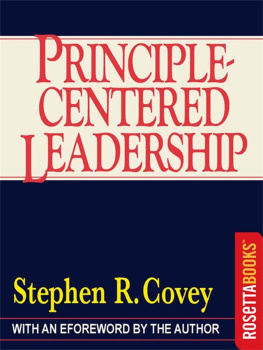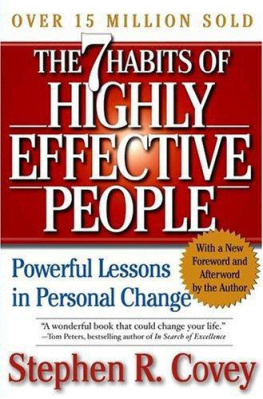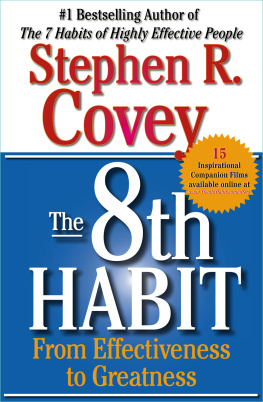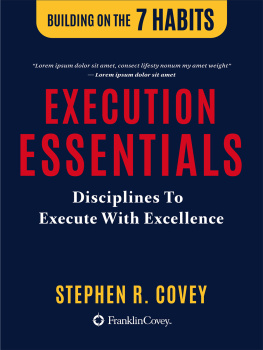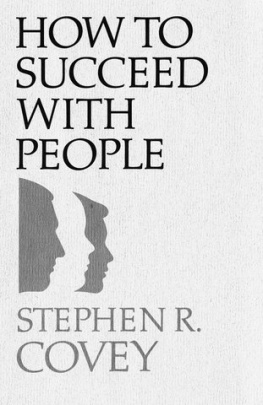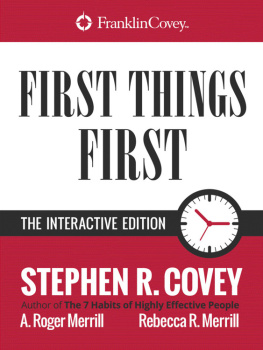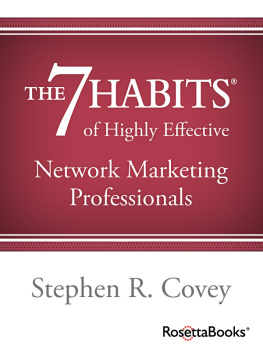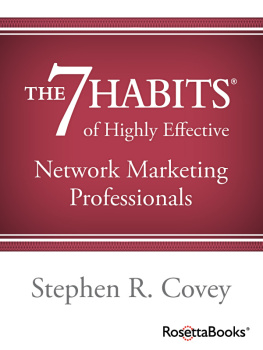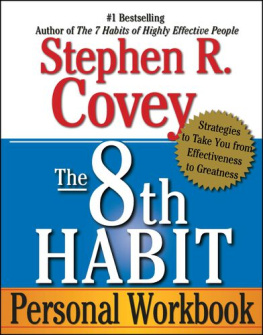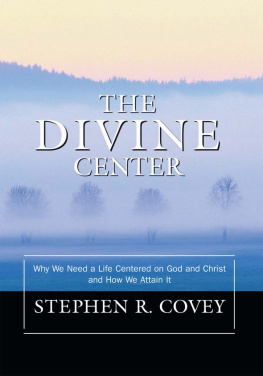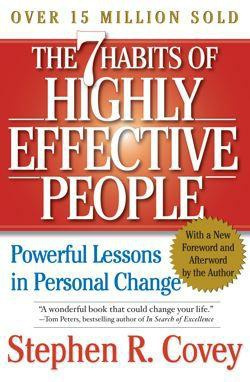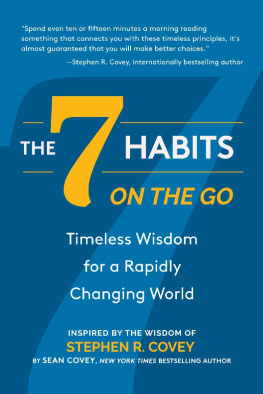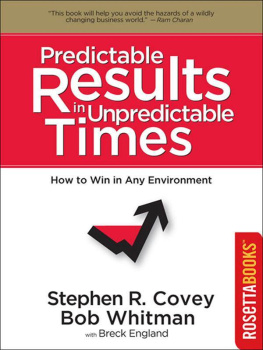Stephen R. Covey - Principle-Centered Leadership
Here you can read online Stephen R. Covey - Principle-Centered Leadership full text of the book (entire story) in english for free. Download pdf and epub, get meaning, cover and reviews about this ebook. year: 2018, genre: Home and family. Description of the work, (preface) as well as reviews are available. Best literature library LitArk.com created for fans of good reading and offers a wide selection of genres:
Romance novel
Science fiction
Adventure
Detective
Science
History
Home and family
Prose
Art
Politics
Computer
Non-fiction
Religion
Business
Children
Humor
Choose a favorite category and find really read worthwhile books. Enjoy immersion in the world of imagination, feel the emotions of the characters or learn something new for yourself, make an fascinating discovery.
- Book:Principle-Centered Leadership
- Author:
- Genre:
- Year:2018
- Rating:4 / 5
- Favourites:Add to favourites
- Your mark:
- 80
- 1
- 2
- 3
- 4
- 5
Principle-Centered Leadership: summary, description and annotation
We offer to read an annotation, description, summary or preface (depends on what the author of the book "Principle-Centered Leadership" wrote himself). If you haven't found the necessary information about the book — write in the comments, we will try to find it.
Principle-Centered Leadership — read online for free the complete book (whole text) full work
Below is the text of the book, divided by pages. System saving the place of the last page read, allows you to conveniently read the book "Principle-Centered Leadership" online for free, without having to search again every time where you left off. Put a bookmark, and you can go to the page where you finished reading at any time.
Font size:
Interval:
Bookmark:
Even though I take full responsibility for the ideas expressed in this book (with the exception of the five collaborated chapters), I gratefully give full credit to my friend and colleague Ken Shelton for making it all possible. For almost eight years, he has served as editor of our newsletter, Executive Excellence, from which this material was taken. He listened to countless speeches, conducted extensive interviews, edited many writings, and then prepared final drafts for my approval of most of the articles collected for this book. He and Greg Link, my make it happen friend and affirming, creative associate, together with the valued encouragement and professional expertise of Bob Asahina, Vice President and Editorial Director of the Summit Division of Simon & Schuster, were all instrumental in the vision and editing of this book.
This work is the fruit of the principle-centered, interdependent, synergy of my 300 plus associates at the Covey Leadership Center and our many stakeholdersclients, suppliers, customers. Their commitment to our mission, principle-centered living, quality, and excellence provide me continuous inspiration, support, and opportunity to learn and improve. To them, I express my deepest admiration and gratitude for their tremendous contributions to humankind.
Specifically I thank these special people who contributed to this book:
Dr. Blaine Lee for his chapter, Principle-Centered Power, and for his friendship and instrumental contributions to our firm and our clients.
A. Roger Merrill for his chapter, Organizational Control Versus Self-Supervision, and his wise synergistic efforts and friendship.
Keith Gulledge for his chapters, Total Quality Leadership and Seven Habits and Demings 14 Points, and his thirst for learning and attention to detail.
Chuck Farnsworth for his chapter on Principle-Centered Learning Environments, and his passionate dedication, along with my loyal brother, John Covey, in applying principle-centered leadership to future generations through our educators, students, and their parents.
Robert Thele for his supportive friendship and for his splendid management of the firm that provides the margin so necessary to forward our mission; my assistants Marilyn Andrews and Boyd Craig for second-mile help, and to my dear son, Stephen, for his liberating emphatic support and walking the talk.
In a very real sense there is no such thing as organizational behavior. There is only individual behavior. Everything else flows out of that.
The main sticking point between Sigmund Freud and Carl Jung dealt with conscience. Freud believed the conscience or superego was basically a social product. Jung believed it primarily to be part of the collective unconscious, transcending the mortal overlay of culture, race, religion, gender, or nationality.
I believe Jung was right and Freud was wrong. In working with thousands of organizations and individuals around the world in preparing mission or value statementsassuming four conditions are present, namely 1) enough people; 2) interacting freely; 3) well informed about the realities of their situation; 4) feeling safe to express themselves without fear of censure, ridicule, or embarrassment then the values or principles part of the mission statement all basically say the same thing, even though different words are used, regardless of nationality, culture, religion, or race.
Gandhi emphasized: A person cannot do right in one department whilst attempting to do wrong in another department. Life is one indivisible whole. John Wesleys mother taught her son, Whatever weakens your reason, impairs the tenderness of your conscience, obscures your sense of God, takes off your relish for spiritual things, whatever increases the authority of the body over the mind, that thing is sin to you, however innocent it may seem in itself.
Further, I believe God is the true name and source of the collective unconscious and is therefore the ultimate moral authority in the universe. The daily prayerful study of His revealed word is the single most important and powerful discipline in life because it points our lives, like a compass, to true northour divine destiny.
It also sets us on a life of service and I fear, unless enough of us capture the spirit of the following conviction of George Bernard Shaw, that the social problems of today will overwhelm the economic machine and discombobulate all of society.
This is the true joy in life, being used for a purpose recognized by yourself as a mighty one.
Being a force of nature instead of a feverish, selfish little clod of ailments and grievances complaining that the world will not devote itself to making you happy.
I am of the opinion that my life belongs to the whole community and as I live it is my privilegemy privilege to do for it whatever I can.
I want to be thoroughly used up when I die, for the harder I work the more I love. I rejoice in life for its own sake. Life is no brief candle to me; it is a sort of splendid torch which Ive got a hold of for the moment and I want to make it burn as brightly as possible before handing it on to future generations.
Stephen R. Covey is the founder and chairman of these 300 plus-member international firms committed to empowering people and organizations to significantly increase their performance capability by applying Principle-Centered Leadership to worthwhile purposes.
The Covey Leadership Centers client portfolio includes over 100 of the Fortune 500 companies as well as thousands of small and mid-size companies, educational institutions, government, and other organizations worldwide. Their work in Principle-Centered Leadership is considered by their clients to be an instrumental foundation to the effectiveness of quality, leadership, service, team building, organizational alignment, and many other strategic corporate initiatives.
Their unique contextual approach to building high-trust cultures by addressing all four levels, personal, interpersonal, managerial, and organizational, is well renowned.
The firm empowers people and organizations to teach themselves and to become independent of the Center. To the adage that goes: Give a man a fish, you feed him for a day; teach him how to fish and you feed him for a lifetime is added: Develop teachers of fishermen and you lift all society. This empowerment process is carried out through programs conducted at the Covey Leadership Center in the Rocky Mountains of Utah, as well as custom corporate on-site programs and consulting.
CLC products and programs provide a wide range of resources for individuals, families, business, government, nonprofit, and educational organizations, including:
Principle-Centered Leadership Week
The Seven Habits Internally Facilitated Leadership Course
Quadrant II Time Management Course
Seven Habits Executive Organizer
Seven Habits Audio Learning System (Eight Tapes)
Custom Education Programs
Seven Habits Audio Tapes (Four or Six Tapes)
Principle-Centered Leadership Audio Learning System (Six Tapes)
Executive Excellence Newsletter
Seven Habits Sales Course
Seven Habits Facilitator Training
Principle-Centered Power Course
Seven Habits Effectiveness Profile
Seven Habits Seminars
Principle-Centered Living Video
Seven Habits and Total Quality
Seven Habits of Highly Effective People Book
Seven Habits Renewal Course
Custom Principle-Centered Leadership Programs
Custom On-Site Programs, Consulting, and Speeches
FranklinCovey Co.
2200 W. Parkway Blvd.
Salt Lake City, Utah 84119
Font size:
Interval:
Bookmark:
Similar books «Principle-Centered Leadership»
Look at similar books to Principle-Centered Leadership. We have selected literature similar in name and meaning in the hope of providing readers with more options to find new, interesting, not yet read works.
Discussion, reviews of the book Principle-Centered Leadership and just readers' own opinions. Leave your comments, write what you think about the work, its meaning or the main characters. Specify what exactly you liked and what you didn't like, and why you think so.

